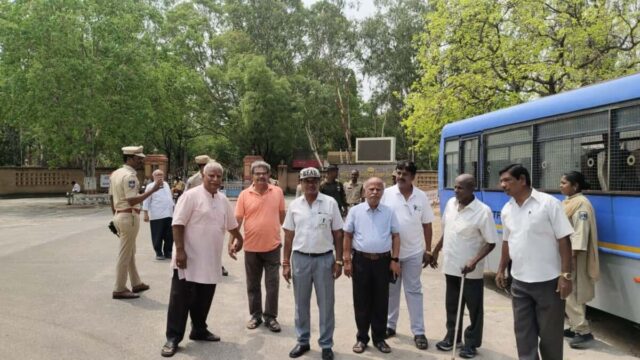Hyderabad: In an unfortunate incident, around 150 pensioners from the Academic Association of the National Institute of Rural Development and Panchayati Raj (NIRDPR), who had come to address their grievances on Saturday, April 19, were prevented from entering the campus by the police.
The pensioners wanted to meet the chairman and members of the parliamentary standing committee on rural development and panchayati raj department to voice out concerns regarding the stoppage of the grant-in-aid to the NIRDPR this year.
However, left to stand outside the main gate in the scorching heat, one of the pensioners fell sick. He was admitted to a hospital and later discharged.

Later, the standing committee met the remaining pensioners who submitted a representation saying, “We urge the committee to recommend the continuation of NIRDPR’s engagement with the Union Ministry of Rural Development (MoRD), while also advising a reorganisation of the current management structure to ensure effective leadership and institutional stability.”
The Academic Association requested the parliamentary standing committee to recommend the following:
- Provide budgetary Grant-in-Aid to NIRDPR.
- Constitution of a MoRD-led committee to oversee administrative and governance matters at NIRDPR.
- Appointment of regular officials in key positions (DDG, Registrar, FA).
- Immediate review and replacement of the current leadership, which has failed to maintain faculty trust or organisational coherence.
Explaining the contribution of NIRDPR to rural development, the pensioners opined that the Union ministry’s disengagement with NIRDPR should be viewed from two perspectives- the need for disengagement and the process of disengagement.
They stated that any move to delink NIRDPR from MoRD represents not only an administrative change but a fundamental shift away from these core national priorities.
They felt that the disengagement threatened to divert NIRDPR into unrelated or short-term consultative activities, undermine its credibility and authority in policy-making, dilute the quality of long-term research and training, and sever its intellectual alignment with the rural development ecosystem.
“NIRDPR’s work has always been aligned with the constitutionally mandated goals of social sector development, decentralised governance, and inclusive growth. Its focus has been on creating public goods, not revenue-generating services. Its structure, processes, and priorities have therefore evolved to support long-term development outcomes, not commercial outputs,” one of the pensioners pointed out.
“The loss of institutional memory and academic support that NIRDPR provides would be a major setback for the ministry,” said one of the pensioners.
They observed that private consultancies or external agencies failed to match the legacy, depth, and alignment of NIRDPR with MoRD’s mission, and that the external agencies lacked the accountability, governance structures, and subject-matter expertise that the central institution brought, making implementation riskier, costlier, and harder to monitor.
“Disengagement does not reduce government expenditure. Instead, it shifts costs to various agencies with disparate mandates, further increasing the burden on MoRD officers for oversight and coordination,” they cautioned.
The Academic Association has expressed concern over the lack of formal communication, inclusive consultation, and strategic clarity from the Director General (DG) of NIRDPR regarding the institute’s roadmap for self-sustainability and institutional transition.
They pointed out that although the Administrative Staff College of India (ASCI) was engaged to formulate a transition strategy, its report appears to have been disregarded. Furthermore, the disengagement plan submitted to the Ministry of Rural Development (MoRD) was neither reviewed internally nor validated externally, raising concerns that it reflects the perspective of an individual rather than a comprehensive institutional consensus.
The Association also highlighted a marked decline in the administrative framework and infrastructure of NIRDPR over the past four years. Citing cost-cutting measures, they noted that basic maintenance has been neglected, resulting in lower training ratings and erosion of the institute’s brand reputation.
They emphasized that in order for NIRDPR to achieve international stature as a global knowledge hub for rural development, it must stay aligned with the country’s rural development priorities. They urged the parliamentary standing committee to recognize MoRD’s pivotal role as the essential link between India’s rural transformation objectives and global capacity-building efforts.

















































